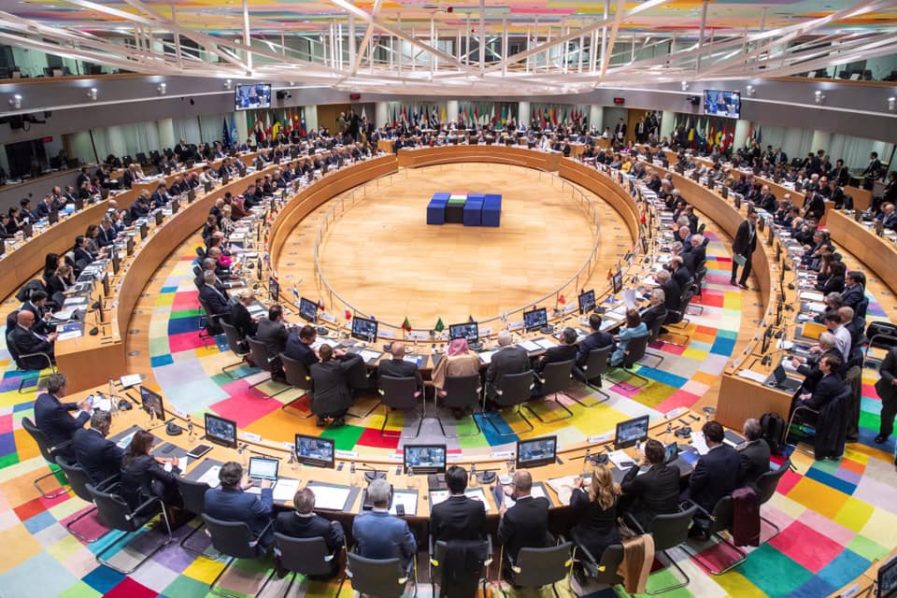Brussels is gearing up to host the seventh edition of the “Supporting Syria” conference on June 14th and 15th. The conference is sponsored by the European Union and will bring together a diverse range of regional and international powers, as well as civil society organizations. Its primary objective is to ensure sustained support for the Syrian people, both within Syria and in the broader region. The conference aims to achieve this by mobilizing the international community to endorse a comprehensive and dependable political solution to the Syrian conflict, in alignment with UN Security Council Resolution 2254. The hope is that this conference will contribute to the cessation of escalating tensions and unrest in the country. Additionally, it seeks to pave the way for renewed dialogue between Syrian President Bashar al-Assad’s regime and the active political parties involved in the Syrian conflict.
Notable Timing
The seventh edition of the “Supporting Syria” conference, scheduled to be held in the coming days, comes at a notable timing coinciding with contrasting developments in the Syrian crisis. This can be further elaborated as follows:
- Regional Engagement with Damascus: The timing of the “Supporting Syria” conference in Brussels aligns with a significant regional shift towards engagement with Damascus. This is exemplified by Turkey’s efforts, with Russian sponsorship and Iranian involvement, to establish understandings and alleviate tensions with Syria. The restoration of relations between Ankara and Damascus has the potential to alleviate some of Syria’s economic crises. Moreover, Ankara’s reorientation towards Damascus presents Syria with enhanced opportunities to address Western pressures imposed on it.
- Syria’s Reintegration into the Arab League: The timing of the “Supporting Syria” conference is closely intertwined with a significant development in Arab-Syrian relations. This is evident from the participation of Syrian President Bashar al-Assad in the Arab summit held in Riyadh on May 19th. It is worth mentioning that Damascus has initiated discussions with Arab nations to establish frameworks and fulfill requirements. These include guaranteeing aid delivery and refugee repatriation, resuming the operations of the Constitutional Committee, releasing detainees, and conducting elections. Additionally, field and military actions related to ceasefires and the withdrawal of foreign forces are being considered.
- Heightened US Pressure: The United States has adopted a more stringent stance towards the Syrian regime, in contrast to European countries that are focused on achieving a political resolution to the Syrian crisis, driven by the adverse impact it has had on their interests and security, particularly in relation to the refugee crisis. On May 30th, the US Department of Treasury announced fresh sanctions pertaining to Syria, targeting the exchange companies “Al Fadel” and “Al Adham.” It is noteworthy that successive US administrations have implemented sanctions on entities and individuals affiliated with the Syrian regime since the onset of the Syrian crisis in 2011. Additionally, on May 12th, US lawmakers introduced a bill that prohibits the recognition of any Syrian government led by Bashar al-Assad. This bill also expands the scope of the US “Caesar” Act, which has been imposing stringent sanctions on Syria since 2020.
- Worsening of the Internal Humanitarian Crisis: The seventh edition of the “Supporting Syria” conference coincides with a deepening humanitarian crisis in Syria, reaching unprecedented levels following the earthquake that struck areas in southern Turkey and northern Syria on February 6th. According to United Nations estimates, the earthquake has caused approximately $9 billion in damages and losses in Syria. These estimates further highlight the need for securing around $15 billion for recovery efforts in the affected regions.
At the same time, on May 13th, Amnesty International called for the continuation of UN aid through the border crossings between Syria and neighboring countries. These crossings are a lifeline for millions of people affected by the February 6th earthquake, as they heavily rely on this assistance for their survival.
Exceptional Significance
The seventh edition of the “Supporting Syria” conference holds exceptional importance due to the contrasting circumstances surrounding the Syrian crisis. Consequently, the outcomes of this conference carry significant weight in addressing the Syrian conflict or, at the very least, mitigating its adverse effects. The upcoming conference in Brussels is expected to play a crucial role in renewing political and financial support from the international community for Syria and the neighboring countries hosting refugees. It is worth noting that a recent conference specifically aimed at donor entities was held to support both Turkey and Syria’s populations in the aftermath of the February earthquake. Nevertheless, the seventh Brussels conference remains the primary event for announcing donations this year for Syria and all neighboring countries.
Additionally, the seventh edition of the “Supporting Syria” conference offers a conducive environment to enhance opportunities for dialogue and communication with civil society and non-governmental organizations operating in Syria and the region. The Brussels conference is also expected to advocate for a moderation of Western hardline stances towards Syria, especially considering the Syrian regime’s recent achievements and its strengthened regional and Arab presence.
In parallel, the seventh edition of the conference can contribute to easing economic pressures on the Syrian regime, particularly as popular protests have resurfaced in certain regions of Syria due to deteriorating living conditions, declining economic indicators, and escalating rates of inflation and unemployment. Consequently, Damascus may utilize this conference as a means to address growing public dissatisfaction and tackle protests that demand improved economic and living conditions for its citizens.
Major Obstacles
The seventh edition of the “Supporting Syria” conference in Brussels presents potential opportunities, but it also faces significant challenges. Chief among these challenges are the United States’ efforts to isolate the Syrian regime, as evident in their persistent hardline positions. While Washington maintains its stance on the departure of the Assad regime and the necessity of a settlement in line with UN Resolution 2254, it concurrently supports the Kurdish militia known as the “Syrian Democratic Forces” (SDF) in northern Syria, recognizing their importance in combating ISIS. However, the US opposes attempts to resolve ongoing disputes between Turkey and Syria as a precursor to normalizing relations between the two parties.
Moreover, the persistent cycle of violence and counter-violence in Syria continues to pose a challenge to any endeavors aimed at assisting the country. Additionally, the reemergence of local protests due to dire economic conditions further complicates the political landscape.
In conclusion, while the “Supporting Syria” conference holds significant importance, particularly in light of the deteriorating situation in Syria, it is not anticipated that the conference’s outcomes will lead to a major breakthrough in addressing the political aspects of the Syrian crisis or alleviating the country’s economic repercussions in the near or medium term. This is primarily due to the adoption of unyielding positions by Western powers, including the United States, towards the Syrian regime.


